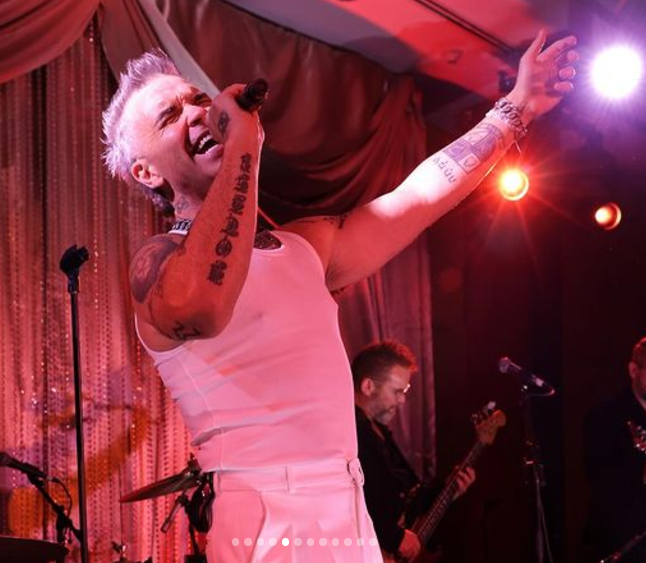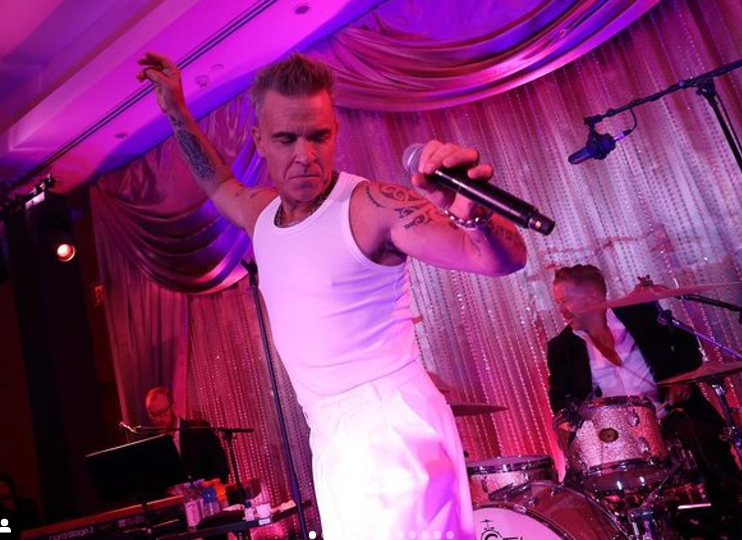Robbie Williams (13 February 1974) is one of the most successful and versatile singer and songwriter. From his early years as a member of the world-renowned boy band Take That to his explosive solo career, Williams has captured the public’s imagination with his unique mix of talent, charisma, and personal struggles. Known for his powerful voice, engaging stage presence, and rebellious nature, Robbie Williams’ journey through the music industry has been as eventful and unpredictable as his personality.
Early Life: A Star in the Making

Robert Peter Williams entered the world on February 13, 1974, in Stoke-on-Trent, England. He was raised in a working-class family by his father, Peter Williams, a sales manager, and his mother, Janet Williams, a warehouse worker. His age is 50. His parents’ tumultuous relationship marked Robbie’s early years, and he later reflected on his childhood as being a difficult one, marked by frequent arguments and emotional distance.
From a young age, Williams showed a natural inclination toward performance, and by the time he was a teenager, he had already begun to pursue acting and singing. He attended the Stoke-on-Trent College where he honed his musical talents. However, it was clear that Williams’ future was in the entertainment industry.
At just 16 years old, he landed a spot in the British boy band Take That, which would go on to become one of the most popular musical acts of the early 1990s. Take That was initially formed by music manager Nigel Martin-Smith in 1990, and the group quickly gained a massive following thanks to their catchy pop songs, polished performances, and boyish charm. Williams joined the group in 1990, shortly before their breakthrough.
Career
Take That: The Beginning of a Superstar’s Journey

Robbie Williams’ time in Take That was marked by early success, but also by personal and professional tensions. The band’s first single, “Do What U Like,” was released in 1991, but it wasn’t until 1993’s “Pray” that they achieved major commercial success. Take That became one of the biggest boy bands in the UK, with Williams becoming a fan favorite for his cheeky, irreverent personality. The group’s hit singles like “Back for Good”, “Relight My Fire”, and “Never Forget” solidified their place in pop music history.
However, as Take That became increasingly successful, Williams struggled with the pressures of fame. His relationship with his bandmates became strained, and he began to clash with the group’s manager. Williams’ party-loving, rebellious nature did not sit well with the disciplined, marketable image of Take That, and by 1995, at the age of 21, he left the band.
His departure was seen as a shocking move at the time, and it marked the end of Take That‘s first era, with the band disbanding in 1996. However, this was not the end of Robbie Williams’ career — it was merely the beginning of his next chapter.
Solo Career: A Star Reborn

After leaving Take That, Robbie Williams embarked on a solo career that would prove even more successful than his time with the band. His debut solo album, Life thru a Lens (1997), showcased his versatility as a pop singer and a songwriter. The album featured the hit single “Angels“, a ballad that became one of his signature songs and catapulted him into the stratosphere of international fame.
Life thru a Lens was followed by I’ve Been Expecting You (1998), which continued Williams’ success, including hits like “No Regrets“ and “Millennium.” His ability to blend pop, rock, and balladry, combined with his swagger and charm, made him one of the most exciting solo artists of the late 1990s and early 2000s.
In 2000, Williams took a brief hiatus from his solo career and found himself at a personal and professional crossroads. He struggled with substance abuse, battling alcohol and drugs, and his public persona became somewhat erratic. Despite this, Williams’ artistic output remained consistent. His 2001 album Swing When You’re Winning, which featured covers of classic swing songs, showcased his vocal ability in a new genre and added to his eclectic appeal.
However, it was Williams’ next two albums — Escapology (2002) and Intensive Care (2005) — that solidified his position as a global music icon. Escapology, which featured songs like “Feel” and “Come Undone”, was a commercial success, and it marked a period of significant reinvention for Williams. His ability to evolve musically and tackle more personal and introspective themes in his songs, coupled with his onstage energy, made him an artist who could not be easily categorized.
Personal Life

In May 2006, he started a relationship with Ayda Field. She was featured in the UFO documentary. On 7 August 2010, they married. The couple have four children named Theodora and Colette (daughters), and Charlton and Beau (sons).
Williams’ candor about his struggles with addiction, anxiety, and depression has endeared him to many fans, who saw his vulnerability as a sign of his humanity. In interviews and documentaries, he spoke openly about his challenges, including his difficult childhood, the pressures of fame, and the impact it had on his mental health.
Throughout these battles, Williams remained a workhorse, constantly releasing new material. His 2006 album Rudebox marked a significant departure from his pop roots, with a more electronic and experimental sound. While the album was divisive, it showed Williams’ willingness to take risks with his music and push the boundaries of his image.
Net Worth
You can read about the following personalities here:-
Damian Lillard, Paul Rudd, Thomas Massie, Lamar Jackson, Judith Jamison, Jordan Chiles, Cole Hauser, Elise Stefanik




